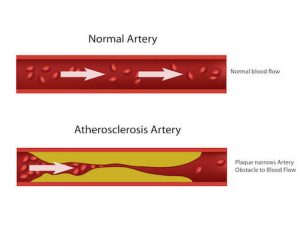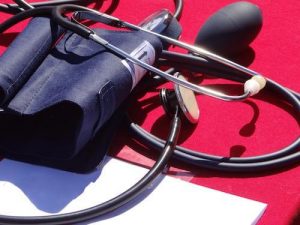Did you know that almost one in four people in the U.S. died of heart disease in 2008? Manhattan Cardiology’s goal in preventing heart attacks is to help drastically reduce that statistic through heart screenings and patient education.
Although we’ve made great strides in the fight against heart disease, it’s still the leading cause of death for both men and women in the United States, claiming about 600,000 lives annually. This is more than the number of deaths caused by all forms of cancer combined and just one of many troubling statistics about heart disease.
What is heart disease?
 Heart disease is a general term that’s used to describe all kinds of diseases that affect the heart. They include heart failure, arrhythmia, valvular heart disease, angina and Coronary Heart Disease (CHD).
Heart disease is a general term that’s used to describe all kinds of diseases that affect the heart. They include heart failure, arrhythmia, valvular heart disease, angina and Coronary Heart Disease (CHD).
CHD, also known as Coronary Artery Disease (CAD), is most notorious for causing heart attacks. CHD occurs when there’s buildup of plaque—a waxy substance formed when cholesterol combines with calcium, fat and other substances—on the walls of coronary arteries.
This buildup happens over time. Eventually, a piece of plaque may rupture inside the artery, causing blood clotting. If the clot grows, it could obstruct blood flow in the coronary artery and cut off the supply of oxygen-rich blood to the heart. If blood flow is not quickly restored, the heart will begin to die.
How to: In preventing heart attacks
Cholesterol plays a big role in the buildup of plaque, which is why a healthy diet and lifestyle can be the single biggest preventative measure for heart attacks.
Traditionally, the main risk factors for CHD are:
- High LDL cholesterol (the “bad” cholesterol)
- Low HDL cholesterol (the “good” cholesterol)
- Diabetes
- High blood pressure
- Smoking
- Family history
- Obesity
- Age (men and women 45+ years and postmenopausal women are most at risk)
The good news is that CHD is preventable at any age. Everyone can practice healthy living habits and avoid a heart attack naturally.
Here are some steps you can take today to start preventing heart attacks in the future:
1. Eat Healthy
Avoid eating foods that are bad for your heart by sticking to a heart-healthy menu. This will help cut down your cholesterol intake, control your blood pressure, keep your sugar levels normal, and keep your weight in check.
It’s important to note that salt raises blood pressure. To maintain your blood pressure, reduce your daily salt intake to 6g or less. This is about one teaspoon.
Your diet should also include low-fat foods and lots of fiber. Healthy options include bread, pasta and wholegrain rice. Fiber, vitamins and minerals, and fruits and vegetables should be a part of your diet, too. Aim to eat at least 400g of fruit and vegetables daily.
2. Engage in physical activity
 Research has shown a 45% reduction in the risk of developing heart disease among people who engage in regular physical activity.
Research has shown a 45% reduction in the risk of developing heart disease among people who engage in regular physical activity.
In some studies, the benefits of LDL cholesterol have been observed even when the subject engaged in moderate amounts of exercise like jogging or walking for 12 miles a week. However, for significant changes like an increase in HDL cholesterol, more intense exercise is needed. This could include jogging or walking for 20 miles a week.
Regular exercise also helps maintain the elasticity (flexibility) of your arteries, ensuring a normal blood pressure and good blood flow.
If you already have heart disease or risk factors (noted above), consult with your doctor before starting intensive exercise like resistance training.
3. Maintain normal blood pressure
High blood pressure, if not checked early enough, can result in a heavy strain on the heart and arteries. This increases the chance of having a heart attack.
You can reduce this by practicing healthy eating habits, moderating alcohol intake and exercising regularly:
- Drink moderately. No more than 140ml a week, spread over at least three days
- Quit smoking
- Consider your family history of heart disease and take precautionary steps
- Commit to regular screening and checkups
Screenings and checkups for preventing heart attacks
 Regular checkup could help in preventing heart attacks waiting to happen. Here are the main health indicators you should be checking each year:
Regular checkup could help in preventing heart attacks waiting to happen. Here are the main health indicators you should be checking each year:
- Fasting Lipoprotein Profile
- Smoking, Physical Activity and Diet
Heart attack treatment options
To prevent or limit the damage a heart attack could cause to the heart muscle, act when you notice the symptoms of a heart attack by calling 911.
- Immediate Treatment: This kind of treatment may start even before diagnosis is confirmed and may include aspirin to reduce blood clotting and Nitroglycerin to improve blood flow to the heart by dilating the blood vessels.
- Medicine: Once the diagnosis is complete, your doctor may prescribe a specific regimen of medicine. Don’t stop, skip or change your dosage unless advised by your doctor.
- Medical Procedures: Treatment may also include a procedure such as coronary artery bypass grafting to provide a new route for blood to flow to your heart.
- Heart-Healthy Lifestyle: Your doctor may suggest changes in your lifestyle to help lower the chances of another heart attack.
- Cardiac Rehabilitation: Cardiac rehabilitation is a program for people who have had a heart attack and includes education, counseling and exercise training.
Knowing how to help aid in preventing heart attacks and following through with a plan will reduce the chances of you ever experiencing the problem. If you’ve already had a heart attack, check with your doctor to see what more you can do to prevent another from happening.
If you would like to schedule an appointment for a heart screening contact Manhattan Cardiology, New York City’s leading Cardiological practice, or schedule an appointment online.

 Heart disease is a general term that’s used to describe all kinds of diseases that affect the heart. They include heart failure, arrhythmia, valvular heart disease, angina and Coronary Heart Disease (CHD).
Heart disease is a general term that’s used to describe all kinds of diseases that affect the heart. They include heart failure, arrhythmia, valvular heart disease, angina and Coronary Heart Disease (CHD). Research has shown
Research has shown  Regular checkup could help in preventing heart attacks waiting to happen. Here are the main health indicators you should be checking each year:
Regular checkup could help in preventing heart attacks waiting to happen. Here are the main health indicators you should be checking each year:
